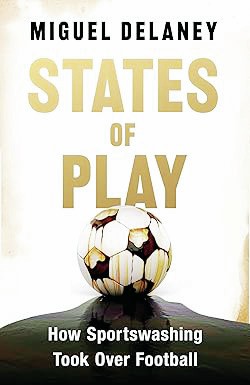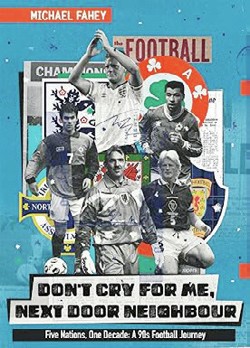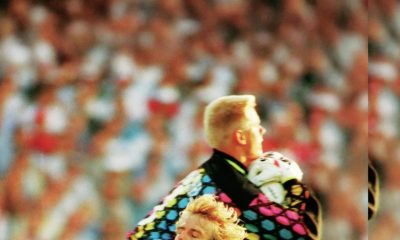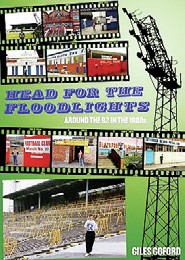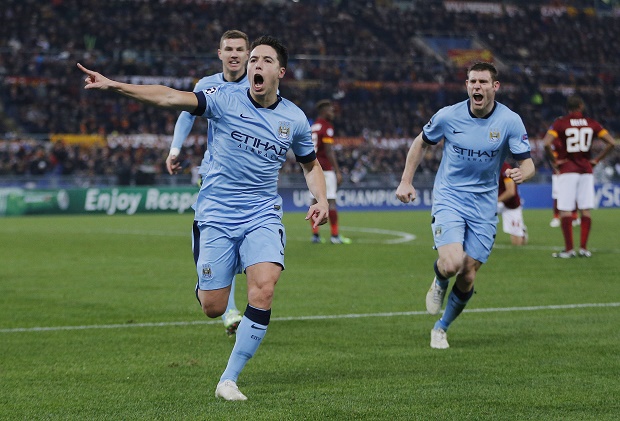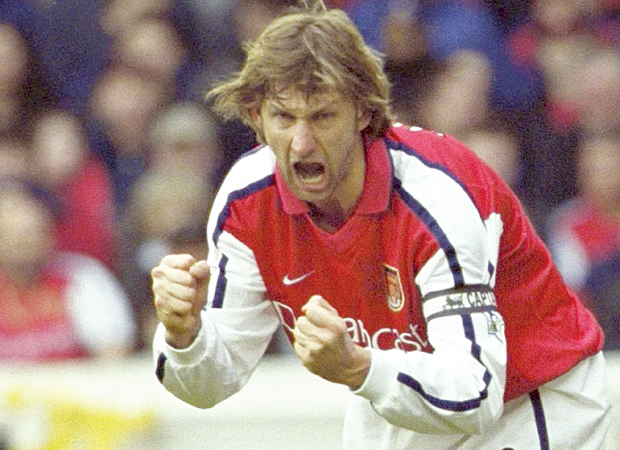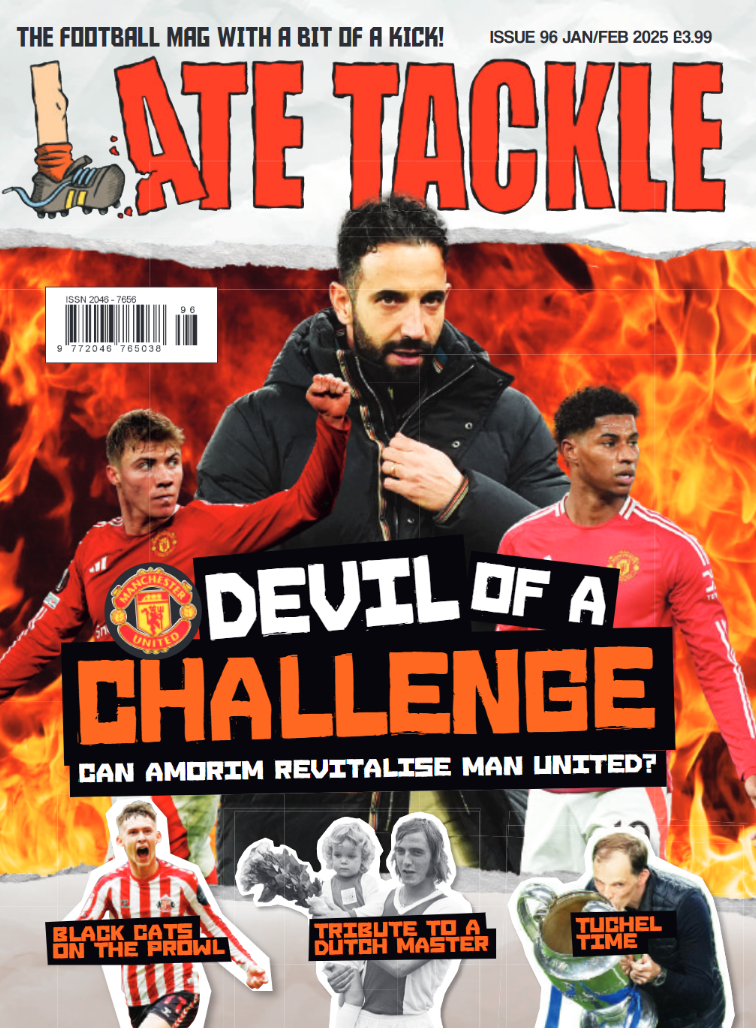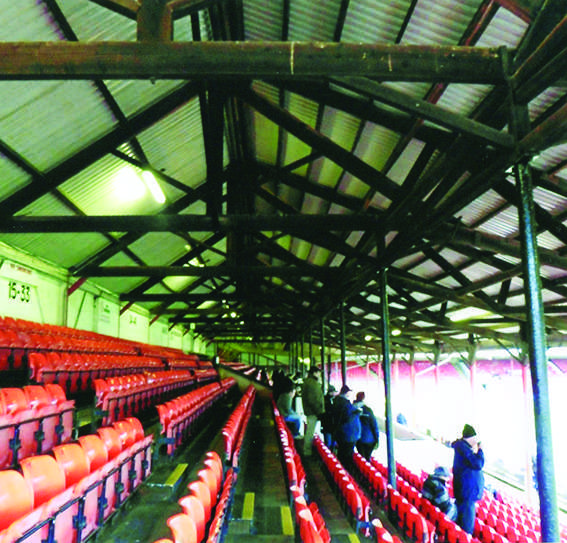
By Andy Freeman

It’s Saturday, November 28, 2015. Rather a dull, drizzly November day and Grimsby Town, the Mariners, are at home, Blundell Park, to Kidderminster in the National League.
The Mariners have been at Blundell Park since 1899 when they first leased the land adjacent to the Imperial Hotel in Cleethorpes. The stands from their previous Abbey Park ground were dismantled and re-erected on the new site.
Season 1901/02 saw them arrive for the first time in Division One and the opening of the Main Stand on September 3, 1901.
It’s still there 115 years later, the oldest wooden stand in English football, still proudly standing with its back to the sea; no-nonsense; unglamorous; functional; unsponsored; its reassuringly unimaginative name unchanged, The Main Stand.
The streets around the ground are clogged with cars and it’s hemmed in by rows of terraced houses and the main Cleethorpes to Doncaster railway line. The Imperial is sadly boarded up now but Mariners’ fans are still making their way to the ground, as those 7,000 did to watch the 1-1 draw with Derby County back in 1901 with Billy Leigh scoring our first goal in top tier football.
It’s still a shock to walk along Harrington Street, a long row of tidy terraced houses and suddenly find the tiny gap, no wider than the average suburban driveway, that marks the main entrance to the ground. The only thing that’s changed since 1901 is the prices above the turnstiles.
We’re two feet above sea level here and over the railway line the brown Humber river laps up against scrubby sand dunes and waste ground. The stiff drizzle-filled wind and the sound of squalling seagulls tells you we’re only 50 yards from the sea.
But it’s the weathered wooden planking that makes up the back of the stand that shocks the most. It’s not been painted or varnished for at least 20 years since the idea of a new ‘Community Stadium’ to be built on the outskirts of town was first mooted.
It’s Dickensian, protecting the seating areas, the two bars and the changing rooms from North Sea winds, rain, snow and hail. There are one or two patched wooden squares towards the top of the stand, once home to the pigeon lofts that housed the pigeons that took regular score updates to the Grimsby Telegraph offices, two miles away in Freeman Street.
It’s here through six doorways cutting through a red brick wall that countless players have reported for duty, signing autographs but keen to get changed and get on with the game.
The very place where part-timer Alec ‘Ginger’ Hall…. of the famous midfield of Buck, Betmead and Hall , used to sling his bike under the stand and be out on the pitch in two minutes. Jimmy Carmichael, Tim Coleman, Joe Robson, Jackie Bestall, Pat Glover…. Some just names and photographs to me but still a part of my ‘matchday experience’.
I show my ticket, the heavy metal turnstile grates, steel against steel, and I’m launched into the ground. Unusually I’m by myself today so it’s an opportunity to ‘watch the watchers’ in the words of sports journalist Patrick Collins in his recent book ‘Among the Fans’.
He quotes a letter from a Bolton Wanderers fan pointing out that ‘football supporters are allocated a club at birth and that fate has given me the Wanderers’. Many fellow Main Stand supporters would nod their heads in understanding.
It’s only two o’clock but many Main Stand stalwarts are early birds. Waiting for kick-off gives them time to re-absorb the surroundings and the occasion.
They meet up with handshakes and joshing, good-natured slaps on the shoulder and smiles. They stand around in small groups either near the pitch or marking out their own third generation season ticket area. Some are quite elderly, some even in ‘time added on’ after their allotted 90 minutes.
The uniform of the Main Stand tribe is dark coloured rainproof coats over numerous layers, sensible three-sided hats and stout shoes. It’s replaced the jacket, cloth cap, muffler and work boots of our Edwardian counterparts but we’ve not had a shift to do this morning. Shopping. Household chores. Reading the paper. No way for a man to spend the morning, I can hear the Edwardians say.
The conversation is routine. Weather…The car….health…Work……before the serious stuff starts. ‘Last week’s away game. The new loan player’s pedigree. Injuries. Recycled Telegraph and Radio Humberside stories. Who’s in and who’s on the bench. Gowling, Toto or Pearson? Bogle up front?’
I move right to the back of the stand and sit where the red bucket seats give way to the old wooden benches. These planks are seriously solid, still coated in shipwrights’ varnish with hand-painted stencilled numbers. I’m sure the smell of Woodbines and pipe smoke still drifts under the roof up here.
The modern ‘Thank you for not smoking in this stand’ notice gives me a moment’s uncertainty. Bradford City. Saturday, May 11, 1985. 56 dead and 265 injured in less than four minutes when the Valley Parade old wooden stand caught fire. Many of the dead were in their 70s; two never managed to move from their seats. We were playing Crystal Palace at home. Kevin Drinkell’s last two goals for the club. Bradford City, a brasher, wealthier cousin to Grimsby Town. The old Barratt Stand here was condemned within two minutes the first time Health and Safety regs came in, according to the rumour.
But I feel safe in the Main Stand.
I gaze up at the steel roof supported by oak beams. The pattern of the supports looks Lincolnshire-barn medieval, hand planed with non-standard wooden pegs miraculously holding the roof together. Yellow and black striped emergency tape swathes some sections of the 1920s metal extension.
And I gaze down and stamp on the solid wooden planks stained with tea, what looks like oil and the scars of generations of hob-nailed boots. Stamping again to keep warm, it feels reassuringly solid.
‘welcometoblundellparkforthe marinersmatch again….’ the antiquated tannoy system blurs into life. Tinny outdated pop music where once we had the Borough Prize Band, Havelock Concert Brass and the Marching Mariners; ‘Blaze Away’, ‘Colonel Bogie’, and ‘Those Magnificent Men in their Flying Machines’.
The Grimsby players start to walk and jog out from the dressing rooms below. Laughing and joking, teasing, chatting. They start to stretch gently, roll their shoulders and prepare.
And the Kiddy players feel the salt in the North-Easter, hear the seagulls, gaze at the stark black and white panels in the Pontoon, look at their shivering miniscule support… and are 1-0 down already.
Family groups are easy to spot from the back, sometimes five or six in a line. Different generations of scarves, the way their hair falls, solid necks. Perhaps they’ve sat here for a hundred years : the Thompsons, the Bellamys, the Osbornes, the Chapmans, the Fawns and will continue to do so until the stand, like an old Grimsby trawler, is de-commissioned.
But the timbers won’t be unpicked and carried carefully to Great Cotes or Peakes Parkway or Europarc or Freeman Street.
I look at the pitch, now a flurry of warming-up players. It’s always a lush green and always in excellent condition. From any seat in this stand it’s framed in a perfect rectangular with no sign at all of the sky.
The black and white shirts look especially vivid. There’s no need for 3D glasses here, this view was television before the days of television, a stage, a remarkable intense performance area, spotlit, waiting for the actors. Today’s exemplary groundsman is Mike Phillips, proud heir to a hundred others.
Then there’s the Press Box. Four rows of tiered writing desks where overcoated, old-school sports journalists with names like ‘Onlooker’, ‘Ancient Mariner’ and ‘Spectator’ (real names Harry Shaw, Wilford Pick and Alf Westland) distilled the on-field heroics into written articles that, pre-television, were many supporters’ only view of what had happened on a Saturday.
They often spent years following the same club, home and away. Live online coverage has almost superseded the match report. The days when Woodbine marinated voices could dictate a 700-word article two minutes after the game had finished with no notes are gone.
Brian Glanville, Geoffrey Green, Frank Keating have all sat and shared their judgements on some of the thousands of Football League and cup games at Blundell Park with both accuracy and flair. Today it all seems to be laptops and checking instant replays on your smartphone, snap, clichéd judgements and colourless routine pieces on Saturday’s game in Monday’s Telegraph.
The Directors’ Box is my big disappointment that day in November. No Havana cigars. No camel hair coats. No high heel and fur coats on directors’ glamorous wives and mistresses. The women had their hair dyed as obviously as the women in the Pontoon.
Disgruntled players, not even in today’s squad, check their phones and text constantly. I want glamour and wealth and exclusivity. What I get is tea in polystyrene cups.
As kick-off time approaches, the stand fills up, noise levels increase and, with it, a sense of anticipation. Bogle on the bench. Jones, the loanee, to start is a major talking point and the Gowling, Toto, Shaun Pearson debate promises to last the 90 minutes and continue well into next week.
And then the crescendo: the tannoy volume is pushed up to max and Les Johnson’s voice backed up by local group Pisces comes from 1978 with our anthem:
Up the Mariners, Up The Mariners
We’re gonna win the cup one day
Up The Mariners, Up The Mariners
It’s Grimsby town that rules okay.
Most of us stand and applaud the arrival of the two teams on the pitch.
The minute’s silence for those killed in the terrorist shooting in Paris is scrupulously observed. I think of others: Edward VII, Churchill, Aberfan, Hillsborough, 9/11 and countless others commemorated in a similar way. November Remembrance Day. The Grimsby Chums, many of them avid Mariners fans, who didn’t come back. Wheelhouse, Martin and Lonsdale killed in action in the footballers’ Battalion in France.
And then it’s down to business – watching a football match with perception and insight. No singing. No chanting, jeering or even much shouting really. Just the hum of a thousand muttered comments to your companions, your brothers, your daughter and sometimes to yourself.
There’s no Oscar Wilde wit here. Just the flat Grimsby accent. ‘Good tackle’, ‘Shoot!’, ‘Handball!’, ‘Offside!’, ‘Never’, ‘Greedy’. There’s very little swearing or practical advice.
Passing movements are approved of as is switching the play. ‘Get it on the floor’. Strong tackling is applauded. Tricky wing play praised. Not tracking back noted. Courage. Commitment. Effort. ‘Play football, Town’.
We like humble and loyal in our players in the Main Stand and manager Paul Hurst has praised his squad for having both virtues. We also like local but that went after the heady days of local school friends Drinkell, Ford, Wilkinson and the three Moore brothers in the 70s.
Loyal is really pleasing now after our experience of a succession of short-term mercenaries. We all held our breath during the summer and then glowed with pleasure and quiet anticipation as Shaun Pearson especially, James McKeown, Nathan Arnold and the others re-signed.
Turning down the extra thousands on offer from League clubs to ‘see it through’ is really appreciated. This wasn’t false, operatic badge-kissing loyalty. In a town where every penny is hard-earned, for them to stay as ‘one of us’ means a lot.
In front of me two large gentlemen with expensive leather document cases are deep in conversation. They have the bulk and demeanour of ex-pros and have been scribbling furiously on paper set out in elaborate columns and quadrants. Agents? Scouts? Spies from Shrewsbury, our League One FA Cup opponents?
I peer just a little too closely, looking for a club crest. They see me looking, smile and turn two massively muscled shoulders to block my view.
‘They’ve got the measure of us’ a woman behind me says just after the half-time whistle. There’s a smattering of applause but no frustration at the 0-0 scoreline. Patience is the number one Main Stand virtue.
Grandma unclasps an heirloom flask and pours out four steaming beverages. Coffee? Tea? Surely not Bovril.
And after stamping our feet, clapping our hands and waving our arms, we’re back to talk of: patterns of play, individual performances, possible substitutions.
Former Mariners are introduced from the centre circle. Great to see them in theory but a little depressing to see the heroes of our youth have aged, stiffened, grown pudgy and soft. In some cases, word filters through, they’re sadly and quietly meandering off into the world of dementia and Alzheimer’s.
Alf Tupper, Gorgeous Gus, Roy Race, Wilson the Wonder Athlete, Limp Along Leslie – they never grew old. Why have these men grown old?
I walk down to pitch side and am surprised to realise how blustery the wind is and how strongly the rain is falling. It does help to explain the unusual lack of accuracy in Town’s passing.
And, of course, the steaming golden rivulets gush down the metal troughs in the urinals, down into that vast subterranean reservoir near the centre of the earth. Hewitts Golden Ale had a similar colour and texture, if not taste, I was once informed.
I can faintly hear from the changing rooms underneath the stand the sound of half-time team talks: the squeak of chalk as Frank Womack runs through ‘system’ and strategy: the clipped tones of fitness enthusiast and disciplinarian, Bill Shankly: our celebrity manager, Allenby Chilton: the magic softly spoken touch of former guardsman Lawrie McMenemy; silence from the old pros as Mick Lyons makes another bizarre team change; Alan Buckley, forceful and certain, with that grating Midlands accent; and today’s honest Paul Hurst exhorting the team to ‘keep us shape’.
And then in the away dressing room: ‘Dixie’ Dean, Denis Compton, Tommy Lawton, Ted Drake, Stanley Matthews, Martin Peters, Geoff Hurst and Bobby Moore and the others sip tea and perhaps draw on a medicinal Capstan Full Strength before preparing to defend The Pontoon.
I gaze around at the other stands on the other three sides of the ground. The Findus (1982) is the young son of the family, ugly breeze block interiors, corporate boxes, a view of the pitch from behind glass and spectacular views of the Humber from the top.
The Osmond, where Kiddy’s 47 fans are huddling today, is a distant relative. The fewer the fans and the further they have come, the greater the applause. We raised the roof for AFC Telford United’s 13 fans one recent Tuesday night and nearly offered to treat them all to a fish and chip supper each at Steels. The Pontoon behind the goal to our right is all bear-pit, tattoos, drums and noise.
And our Main Stand is a dignified grandfather of a stand. I’ll be happy to spend my last footballing years here, a touch greyer every match, a touch greyer every year.
I sip a scalding tea and join in the chat. There won’t be time at the end of the game. I’m quietly optimistic but many aren’t. We’re the better side but we’ll need a flash of luck or brilliance,
‘They’ve got the measure of us,’ the woman repeats.
‘They’re bound to nick it,’ says her teenage daughter, already sharing the attitudes and values of her parents and grandparents. Lovely.
The 1950s floodlights come on. Songs and chants from the Pontoon and the Findus are not taken up. Apart from the unique, heart-warming ‘Maaa-riii-ners’. Where did that come from? The sound of a seagull? A link with work and tradition and Grim and Havelock who struggled ashore not a hundred yards from here. The reason for the town’s existence. A three syllable poem.
A father and son in front of me sit silently, patiently with remarkable intensity following the ball and the players in possession.
Mints of some sort pass between them every ten minutes or so. Father’s in his 70s, son in his 50s.
And when ‘Podge’ Amond finally breaks the tension with a headed goal worthy of Matt Tees, they stand and rather wonderfully shake hands.
We’ve grown to really like this set of players, most of whom have the talent to play at a much higher level. Jack Waterman in his 1978 article in The Listener wrote about the 1933-34 team ‘whose names I could, and can still, recite far better than the litany: Tweedy; Kelly and Jacobson; Hall, Betmead and Buck; Dyson, Bestall, Glover, Craven and Lewis’.
Will some young people avoid the overpowering pressure to support the glamorous Manchester Uniteds, the Chelseas, the Liverpools of this world and in 2059 still be able to recite ‘McKeown, Tait, Pearson, Gowling, Townsend, Toto, Monkhouse, Arnold, Clay, Bogle, the wonderful Craig Disley and ‘Podge’ Amond? I really hope so.
I try to focus on the crowd at the expense of the game, not always successfully.
What would George Tweedy have made of James McKeown’s all-pink goalkeeping strip and matching pink boots?
How on earth did 31,651 fit into this ground on February 20, 1937?
Why did Jackie Bestall only earn one measly England cap?
I see a ghostly pigeon fly in the direction of Freeman Street.
And then the final whistle goes. 1-0 to the Town. Five wins in all competitions in November. Not bad, the Main Stand say. But there’s only one automatic promotion spot. Everyone else seems to be winning.
It’s raining heavily as I walk past the humble Kidderminster coach. It’s already warming up for the journey home. Generations of buses, charabancs, stagecoaches even have parked here.
I have one final cheery vision. The Town directors load kits of sepia haddock into the luggage compartment. A traditional complimentary gift to every away team. Handshakes. Sportsmanship. Waving farewells. Almost making the legendary ‘wet Tuesday night in Grimsby’ bearable.
And one final glimpse of players’ families in Sheffield, Blackburn, Nottingham, Crewe and all the other footballing towns, tucking in next day to the most succulent, purest haddock they will ever eat in their lives.
Will all this be lost if we move to an identikit, characterless stadium? But perhaps that’s what the Abbey Park men said about the move to remote, out-of-town Blundell Park in 1899.
It’s raining even more heavily as I walk quickly along the parallel streets as the ground quickly empties. How do I feel? Euphoric? Quietly optimistic?
No disrespect to the likes of Chelsea and their claim to have 400 million fans worldwide but would any one of them have gained more pleasure from a game of football than me in our 1-0 victory in the National League on a wet Saturday in that old steam trawler of a football ground, Blundell Park, and that unique Main Stand?

